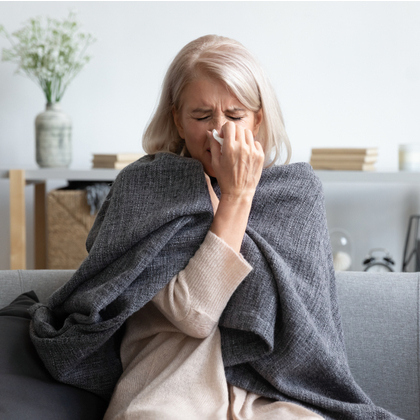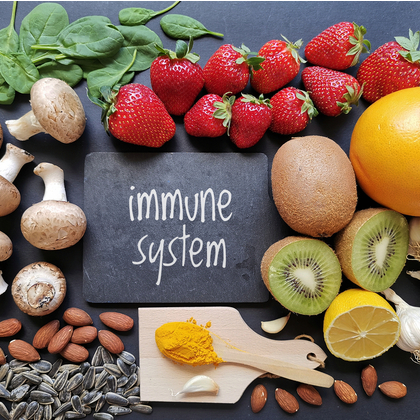
Most of us realise our immune systems are essential for our health. But some people have immune systems that aren’t as strong or as balanced as they should be, so that they don’t work properly. This is known as immunosuppression, but you may also see it referred to as immunocompromised or immunodeficiency.
If your immune system is suppressed it may not do a very good job of stopping viruses, bacteria, parasites and other harmful organisms (pathogens) invading your body and making you ill. All parts of your immune system can be affected, including your spleen (which is an important immune system organ) and your lymph nodes. However, many immunosuppression disorders are a result of a problem with the immune system’s white blood cells, which are important because they attack and destroy pathogens.

Find out more about the different parts of your immune system and how they protect you against ill health by reading our guide to understanding how the immune system works.
Immunosuppression can affect different people to different degrees. Some may be affected mildly, while others may have severe immunosuppression, where catching a common cold could make them very ill (or even be life threatening). In some cases, immunosuppression can be temporary, and those affected may find their immune system returns to normal after a while. In others, however, having a suppressed immune system can be permanent. How long you’re affected for will depend on what’s causing the problem in the first place (see ‘Types of immunosuppression’, below).
Common effects of immunosuppression
People whose immune systems are suppressed tend to be more vulnerable to infection than those with healthy immune systems. They may get infections more frequently, and their symptoms may be more severe and long-lasting. They are also more likely than others to develop sepsis, which is a reaction to severe infection that can be fatal if it isn’t treated early. And as a result of the way their immune systems react to infections, people with immunosuppression are more likely to need antibiotics or hospital treatment for an infection than those whose immune systems are working normally.
Immunosuppression can also increase your risk for certain types of skin cancer (i), including squamous cell carcinoma, melanoma and Kaposi’s sarcoma. Experts aren’t sure why this happens, but it could have something to do with the fact that the immune system is involved in destroying sun-damaged skin cells (if these are left in place they can go on to multiply and develop into cancer). Or it could be possible that some medicines that cause immunosuppression affect skin cells and make them more susceptible to cancer development.
If you’re immunosuppressed, you may need extra doses of some vaccinations to help you develop an effective immunity. There are also some vaccinations that aren’t safe for people with a compromised immune system, namely ‘live’ vaccinations containing live viruses or bacteria. These include the BCG vaccine that protects against tuberculosis and the MMR (measles-mumps-rubella) vaccine, both of which can cause infection in someone with a very weakened immune system.
Types of immunosuppression
There are several reasons why your immune system may not be a strong as it should be. These fall into two main types:
Primary immunodeficiency
This happens in someone born with a condition that directly affects their immune system. According to the charity PID UK there are more than 300 different congenital conditions that leave people with parts of their immune system missing or not working (ii). These conditions are rare and usually diagnosed during childhood, including severe combined immune deficiency (SCID), common variable immunodeficiency, combined immune deficiency (CID), chronic granulomatous disorder (CGD) and hyperimmunoglobin E syndrome (HIES).
Secondary (acquired) immunodeficiency
Unlike primary immunodeficiencies, these tend to develop later in life and can often be temporary rather than permanent, depending on what causes them. They are also more common that primary immunodeficiencies. There are several causes of secondary immunodeficiency, including:
Medicines
Chemotherapy and radiotherapy are good examples of medical treatments that can weaken the immune system. Medicines taken by people who’ve had organ or bone marrow transplants suppress the immune system too, because a dampened immune system can make organ rejection less likely.
Meanwhile steroid tablets – which are widely prescribed for conditions that cause inflammation – are a common cause of immune suppression. However you will usually only be affected if you take a high dose of oral steroids for a long period (lower doses, in general, aren’t thought to have any effect on the immune system (iii) ).
Other medicines that suppress the immune system include some of those used to treat autoimmune conditions, such as rheumatoid arthritis, psoriasis, psoriatic arthritis, Crohn’s disease and ulcerative colitis.
Organ transplant
Besides the immune-weakening effect of organ rejection medications, organ transplants can make you more susceptible to infection during the first few weeks after your operation because your white blood cell count will usually be lower than normal.
Illness
Some long-term medical conditions can depress your immune system too. These include cancers of the bone marrow and white blood cells, such as leukaemia and lymphoma, as well as HIV (human immunodeficiency virus) and AIDS (acquired immunodeficiency syndrome). You may also experience a degree of immunodeficiency if you have an autoimmune condition such as lupus, rheumatoid arthritisor type 1 diabetes.
Problems with your spleen
If you’ve had your spleen removed – after being ruptured in an accident, for instance – or if your spleen doesn’t work as well as it should (as a consequence of a condition such as sickle cell anaemia, to name one example), it can lead to immunosuppression. This is because your spleen is an important part of your immune system, and without it some of your immune cells may work less effectively (or not at all).
Age
As people get older, their immune systems become less effective. Find out more about why immunity decreases with age. New-born babies, meanwhile, have an undeveloped immune system – though most have immune systems that get stronger and more efficient as they grow.
Pregnancy
Women who are pregnant have a weakened immune system. This is normal and indeed an essential part of pregnancy, since a strong immune system could identify a foetus as a threat and respond by attacking it. Having a weakened immune system is why women are encouraged to get a flu vaccine if they’re pregnant during the winter months, as they have an increased risk of developing complications of flu.
Other things that may affect your immune system include poor nutrition (iv) and drinking too much alcohol (v). Exposure to environmental chemicals such as some pesticides, heavy metals and air pollutants such as cigarette smoke (vi) could also have an impact on your immune system, making it less effective.
How to spot a weakened immune system
If you have immune suppression you may get infections more frequently than others including colds, sinus infections, skin infections, ear infections, chest infections, conjunctivitis and yeast infections (thrush). Some people with immunosuppression also have chronic gum disease.
When you have an infection you may have more severe symptoms that last longer, and you may also be more prone to developing complications (if you have a throat infection, for instance, it can often develop into a chest infection or pneumonia). So in general, you may be sick more often and for longer periods than other people.
Immunosuppression can also make it more difficult to spot infections, especially in severe cases. That’s because a healthy immune system often triggers symptoms such as sneezing, coughing, inflammation and a high temperature to destroy invading pathogens. If your immune system is weak, however, it may not launch these particular defences, which can result in a more serious infection.
Children with primary immunodeficiency may also experience delayed growth and development.
How to spot a weakened immune system
Having frequent infections doesn’t necessarily mean you have a suppressed immune system, but if you are concerned it’s a good idea to see your GP. Immunosuppression can usually be diagnosed easily via a blood test, as this can reveal your white blood cell count and levels of immune system proteins called immunoglobulins. Depending on the result of your blood test you may then need further tests to confirm the diagnosis.
On the other hand, if you have diagnosed immunosuppression you should always see your doctor as soon as you notice the first signs of an infection, even a minor one. Most of us can fight off minor infections without any medical help, but a simple cold can become serious very quickly in someone who is immunosuppressed.
You should also get urgent medical attention if you have immune suppression whenever:
-
You feel generally unwell with dizziness, drowsiness or feelings of confusion
-
You have a high temperature (38C or higher)
-
You have a rash
-
You have changes in your skin that could be a sign of skin cancer
-
You have chills or you’re shaking
-
Your eyes hurt when exposed to light
-
You have fits (seizures)
Immunosuppression treatments
There are several approaches for the treatment or management of immunosuppression, all of which depend on what’s causing your condition. If your immune system is suppressed as a result of taking medication, for instance, stopping that medication and using an alternative – or reducing the dose of the medication – is often an effective solution. There are also medicines used to treat illnesses that can cause immunosuppression, including anti-HIV medication and chemotherapy. Some people, on the other hand, may need a stem cell (bone marrow) transplant if they have a genetic immunosuppression condition or some forms of cancer.
Meanwhile there are a few things you can do yourself, not to treat your condition but to make getting an infection less likely:
-
Avoid contact with people who have infections, including colds and flu.
-
Keep your hands as clean as possible by washing them frequently with soap and water (use a good-quality hand sanitiser if you’re out and about with no access to soap and water).
-
Practise not touching your face – especially your eyes, nose and mouth – when you’re away from home and in public areas. It may not be easy at first, but you can train yourself to avoid face touching.
-
Avoid eating anything that could possibly put you at risk of food poisoning. Other measures include keeping your hands, kitchen worktops, dish cloths, tea towels, chopping boards and cooking utensils as clean as possible. Cook your food thoroughly – make sure meat products are cooked through with no pink meat inside – and keep raw meat away from other foods (store it on the bottom shelf of your fridge so it can’t touch or drip onto any other foods).
-
Make sure your home is clean and as germ-free as possible by cleaning and disinfecting surfaces that are often touched (such as light switches and door handles, for instance).
-
Eat as healthily as possible, making sure you get your 5 A Day. Learn more about foods that may help boost your immune system.
-
Get plenty of sleep and try to make time for relaxation, especially if you’re under stress.
-
If you smoke, consider quitting. Find out more about giving up by reading our guide to stopping smoking
-
Make sure your routine vaccinations are all up to date, and always get your annual flu jab every autumn.
There’s lots more to discover about immune health in our Immunity Pages. Meanwhile if you want information about a wide range of health issues, visit our pharmacy health library.
References:
-
Rangwala S., Tsai KY., Roles of the Immune System in Skin Cancer. Br J Dermatol. 2011 Nov;165(5):953-965. Available online: https://www.ncbi.nlm.nih.gov/pmc/articles/PMC3197980/
-
Available online: http://www.piduk.org/whatarepids/basics
-
Available online: https://patient.info/allergies-blood-immune/immune-system-diseases/immune-suppression#nav-3
-
Bourke. CD, Berkley. JA, Prendergast. JA. Immune Dysfunction as a Cause and Consequence of Malnutrition. Trends Immunol. 2016 Jun;37(6):386-398.Available online: https://www.ncbi.nlm.nih.gov/pmc/articles/PMC4889773/
-
Happel. KI., Nelson S., Alcohol, immunosuppression, and the lung. Proc Am Thorac Soc. 2005;2(5):428-32. Available online: https://pubmed.ncbi.nlm.nih.gov/16322595/
-
Stampfli. MR., Anderson GP., How cigarette smoke skews immune responses to promote infection, lung disease and cancer. Nature Reviews Immunology. 2009;9:377-384. Available online: https://www.nature.com/articles/nri2530
Related Posts
Disclaimer: The information presented by Nature's Best is for informational purposes only. It is based on scientific studies (human, animal, or in vitro), clinical experience, or traditional usage as cited in each article. The results reported may not necessarily occur in all individuals. Self-treatment is not recommended for life-threatening conditions that require medical treatment under a doctor's care. For many of the conditions discussed, treatment with prescription or over the counter medication is also available. Consult your doctor, practitioner, and/or pharmacist for any health problem and before using any supplements or before making any changes in prescribed medications.

Christine
Christine Morgan has been a freelance health and wellbeing journalist for almost 20 years, having written for numerous publications including the Daily Mirror, S Magazine, Top Sante, Healthy, Woman & Home, Zest, Allergy, Healthy Times and Pregnancy & Birth; she has also edited several titles such as Women’ Health, Shine’s Real Health & Beauty and All About Health.
View More



